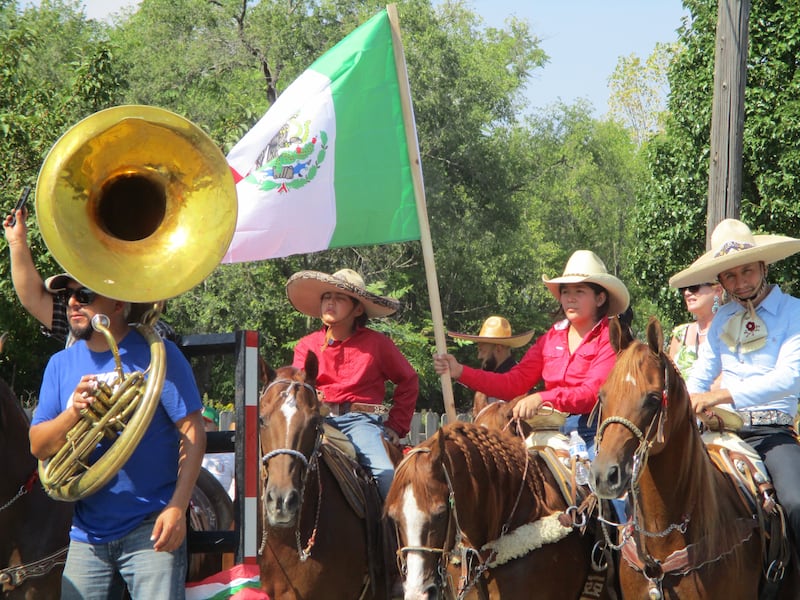The Mexican Independence Day Parade, a more than 60-year tradition in Joliet, takes place Saturday under circumstances that are unusual, to say the least.
What is typically one of the biggest parades in the city coincides with the start of a federal crackdown on illegal immigration coming to Chicago and aimed primarily at Mexicans and other Hispanics.
Joe Belman, a 101-year-old Mexican-American and World War II veteran who is one of the grand marshals in the parade, said he thinks people in Joliet will not be scared away from the event by what the Trump administration has dubbed the “Midway blitz.”
“I don’t think we’ll have any trouble with the parade myself,” Belman said. “I think everybody in the community here is well aware of what [President Donald] Trump is trying to do.”
:quality(70)/cloudfront-us-east-1.images.arcpublishing.com/shawmedia/H62LZMVM7ZFKFJFMF6JMETLEW4.jpeg)
The “Midway blitz” is part of a Trump administration campaign against illegal immigration that targets lawlessness and Hispanics.
The parade on Saturday, however, is an annual reminder of the decades-long contributions of Mexican immigrants to their new nation and the city of Joliet.
The parade this year is dedicated to patriotism and law enforcement.
In addition to Belman, the grand marshals are Jose Duenez Sr., the father of staff Sgt. Jose Duenez Jr., who died this year in an Army training mission; Tony Arellano, a Vietnam War veteran who has been a local advocate for veterans and the disabled; and retired Joliet police Lt. George Hernandez.
The parade on Collins Street, which begins at 1 p.m., will make a stop at a statue of Sator Sanchez, a World War II hero from Joliet who went beyond the call of duty to serve as an airplane gunner in 35 combat missions in Europe before being killed in Germany.
:quality(70)/cloudfront-us-east-1.images.arcpublishing.com/shawmedia/4MDG7XFHAVGN7GEZVOGMMMKXKM.JPG)
“The community is very eager to have this event happen,” said Emmanuel Lopez, executive director of the Joliet City Center Partnership.
The JCCP is one of the parade organizers. It helped bring back a parade that did not happen last year. Bringing back the parade has been important to the Mexican-American community, possibly overriding fears that Immigration and Customs Enforcement may show up looking for people to deport.
Lopez said he expects the focus of ICE and the “Midway blitz” will be far from Joliet, leaving paradegoers free to enjoy the event Saturday.
:quality(70)/cloudfront-us-east-1.images.arcpublishing.com/shawmedia/Y4Y2SYYPTNA4NKBY7RLN5MGKPA.JPG)
He said there has not been evidence that enthusiasm for the parade has waned.
“As of right now, we have a full lineup as far as entries are concerned,” Lopez said.
Parade organizers had to turn away some organizations that wanted to march in the parade after limiting the number of entries to 50, Lopez said.
“We had a lot more people that were interested,” he said. “We wanted to keep it at 50 so we could keep the parade organized. We’re technically sold out.”
Joliet police will be present, as they have been at past Mexican Independence Day Parades and other city events, for crowd and traffic control.
:quality(70)/cloudfront-us-east-1.images.arcpublishing.com/shawmedia/RP7BNSF6VZGDBFS526SOJAFYFM.JPG)
“Our officers will be on scene at the parade for the sole purpose of providing traffic control, ensuring crowd safety and supporting event organizers,” Sgt. Dwayne English, spokesman for the Joliet Police Department, said in an email. “Our only focus is to provide a space in which our citizens can celebrate and enjoy the parade in a safe and welcoming environment.”
English said Joliet police have not been contacted by ICE or any federal agency involved with the “Midway blitz.”
“We have no information that suggests Joliet is involved in or will be affected by it,” he said.
The parade will run along a traditional route on Collins Street from Columbia to Cass streets. The area is the center of a Hispanic commercial district that features supermercados, stores and offices in an older section of Joliet that was revived by immigrant entrepreneurs.
:quality(70)/cloudfront-us-east-1.images.arcpublishing.com/shawmedia/AYH5DPV2GVEFBPWYMUWBJHUWPM.jpg)

:quality(70)/s3.amazonaws.com/arc-authors/shawmedia/c957a8ff-14a0-492e-82d7-3c005b3cd732.png)